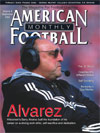AMERICAN FOOTBALL MONTHLY THE #1 RESOURCE FOR FOOTBALL COACHES
Article CategoriesAFM Magazine
|
No Excuses, No Apologies, Just FootballGuy Morriss made a living moving defensive lineman. Now he is moving his players, university, fans and the state of Kentucky to believe in his philosophy.by: Richard Scott © More from this issue The Morriss File 1988-89 New England Patriots - Offensive Line 1991 Mansfield, Tex., HS - Offensive Coordinator 1992 Washington (PSFL) - Head Coach 1992-93 Valdosta State - Offensive Line 1994 Arizona Cardinals - Offensive Line 1995 San Antonio (CFL) - Offensive Line 1996 Mississippi State - Offensive Line 1997-00 Kentucky - Assistant HC, OL 2001 Kentucky - Head Coach Playing Career 1969-72 TCU - OL/TE 1973-83 Philadelphia E....The full article can only be seen by subscribers. Subscribe today!
|
|
|||||||
| HOME |
MAGAZINE |
SUBSCRIBE | ONLINE COLUMNISTS | COACHING VIDEOS |
Copyright 2026, AmericanFootballMonthly.com
All Rights Reserved





